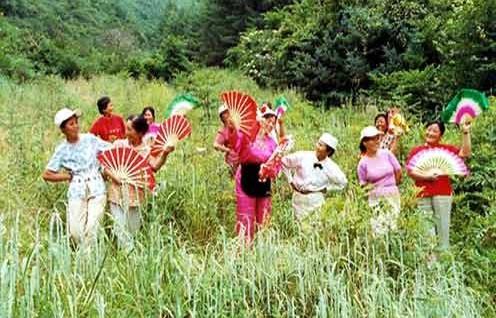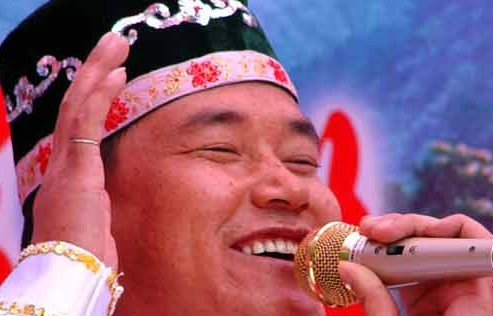Arts and traditions
The Flower Ballad (ICH)
Updated: 2013-10-29( chinaculture.org )
The first?list of Intangible Cultural Heritages was approved by the nation in 2006.
(The Flower Pageant of Lotus Flower Mountain, The Flower Pageant of Songmingyan, The Flower Pageant of Erlang Mountain, The Flower Pageant of Laoye Mountain, The Flower Pageant of the Danma Tu Minority, The Flower Pageant of 7-miles Temple, The Flower Pageant of Qutan Temple, and the Flower Pageant of Ningxia Hui Minority Mountain)
Year: 2006
Sort: Folk Music
Serial No.: Ⅱ-20
Declarer:Gansu province,Qinghai province,Ningxia Hui autonomous region
The Flower Ballad, always sung outside villages, is commonly known as 'wild music'. The ballad spread through eight nationalities in Gansu, Qinghai,Xinjiang provinces and Ningxia Hui autonomous region, and combined with local Chinese dialects. The ballad is a part of a group of folk songs, which are known as mountain singing.
1. The Flower Pageant of Lotus Flower Mountain
Declarer: Kangle county, Gansu province
The Mountain of the Lotus Flower is situated in the southwest of Kangle county. The Flower Pageant is a grand meeting, which is held once a year. The ballad was popular as early as 300 years ago.
The pageant is generally held for 6 days and the number of participants can reach above 100,000 people.
The Flower Pageant of Lotus Flower Mountain has been called the "soul of the Northwest" and the "encyclopedia of the Northwest" by scholars. But in recent years, with the scale of the pageant gradually decreasing, the number of those who sing the ballad is decreasing also and therefore needs protection.
2. The Flower Pageant of Songmingyan
Declarer: Hezheng county, Gansu province
The Flower Pageant of Songmingyan, formed during the Ming Dynasty(1368-1644), is held every April 26 to 29 in Songmingyan, in a state forest park and provincial scenic spot. This grand meeting is extremely lively, and attracts thousands of participants.
The pageant has a fixed time and place for singing. The singing is generally done on the hillside, the lawn, at the foot of the mountain, or the forest. The forms of singing are various, including the solo, singing together and the duet. The accompanying instruments are plentiful too, such as the mimi anderhu.
3. The Flower Pageant of Erlang Mountain
Declarer: Min county, Gansu province
The Flower Pageant of Erlang Mountain came from Min county in the Ming Dynasty (1368-1644).
At the beginning of every May, people perform ceremonies and pray for an abundant harvest. May 27 is the most important day of the celebrations. Hundreds of thousands of people come together and sing 'the Taomin Flowers'. Because of modernization, the celebration is dying out and needs to be protected.
4. The Flower Pageant of Laoye Mountain
Declarer: Datong Hui and Tu minority autonomous county, Qinghai province
The Flower Pageant of Laoye Mountain, formed in the Ming Dynasty (1368-1644), is a large-scale ballad activity held on Laoye Mountain in Hui and Tu autonomous county, Qinghai province, which is held every June 6 of the lunar calendar. Over the past several hundred years it has ceased to be something to appease the gods and is now practiced to entertain people. Generally, there are two versions of the ballad. One is the spontaneous singing by the mass and the other is organized singing that appeared after 1949. The ballad has the fixed stages, and the singer is selected through competition. The ballad is mainly about love, as well as religion, customs and legends. The ballad has unique melodies, beautiful and lyrical, which are deeply loved by people of all nationalities in Datong county.
5. The Flower Pageant of the Danma Tu Minority
Declarer: Huzhu Tu minority autonomous county, Qinghai province
The Flower Pageant of the Danma Tu Minority, formed in the late Ming Dynasty (1368-1644). It is a collection of the opera performance, singing and commodity trade. It is generally held every June 13 to 17 of the lunar calendar.
Initially the pageant was a traditional assembly, in which the local people prayed for good weather and harvests. However, it has become an important display of Tu Minority folk customs.
The Danma Flowers Pageant has a long history and enjoys a good reputation in Qinghai province and it is necessary to protect it.
6. The Flower Pageant of 7-Mile Temple
Declarer: Minhe Hui and Tu Minority autonomous county, Qinghai province
The Flower Pageant of seven-mile Temple,held every June 6 of the Lunar calendar is at least 100 years old. When the day comes, about 70,000 people holdingumbrellas gather and sing the flowers ballad all night.
The Flower Pageant of 7-mile Temple has strong local flavor and is popular in the Northwest. There are numerous singers in attendance. In which many senior singers' songs are very difficult to hear usually. The singers mostly come from the folk, and sing the love songs primarily.
7. The Flower Pageant of Qutan Temple
Declarer: Yuedu county, Qinghai province
The Flower Pageant of Qutan Temple is also the local temple fair, which originated in the Qing Dynasty(1644-1911) and is held every June 14 to 16th of the lunar calendar. The pageant is large and influential. The Flower Pageant provides folk singers a good chance to sing from to the entire province and even the whole northwest area. The Han, the Zang and other nationalities all participate enthusiastically.
8. The Flower Pageant of Ningxia Hui Mountain
Declarer: Ningxia Hui autonomous region
The Mountain Flowers, also named the Dried Flowers, the Mountain Songs or the Wild Flowers, is one kind of representative ballad style, which is widespread in the Ningxia Hui autonomous region. It inherited the ancient ballad characteristics of Long Mountain that repeat once every three sentences and allows for improvisational singing and adding words to the songs.
The Mountain Flowers have a unique style and is highly valuable for ethnological research. Few singers now know the Mountain Flowers styles and they need to be protected.
 |
|
The Flower Ballad, always sung outside villages, is commonly known as 'wild music'. The ballad spread through eight nationalities in Gansu province. |
 |
|
The Flower Ballad, always sung outside villages, is commonly known as 'wild music'. The ballad spread through eight nationalities in Gansu province. |
 |
|
The Flower Ballad, always sung outside villages, is commonly known as 'wild music'. The ballad spread through eight nationalities in Gansu province. |
 |
|
The Flower Ballad, always sung outside villages, is commonly known as 'wild music'. The ballad spread through eight nationalities in Gansu province. |


